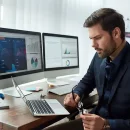Important Characteristics of the Best Financial Advisors

As earning members of society, most people have certain financial aspirations that are linked to their personal goals. To achieve such goals, you must learn to manage your income and wealth efficiently so that it grows with time. In the initial phase of your professional life, it is easy for you to manage your taxes and figure out how to save. But, as you grow professionally and earn more, the nuances of handling your wealth should be advised by a professional, in this case, a financial advisor.
To begin with, it is important to understand how exactly financial advisors help investors and the important characteristics the best financial advisors bear.
The many roles of a financial advisor
A financial advisor is that one person with whom you plan your financial strategies, based on your personal and professional life goals. The two of you will have to have multiple open discussions on your wealth management plans and the strategies that shall be the best to reach your financial goals.
The financial advisor’s job also includes knowledge sharing. From the time you hire them, they start helping you understand the nuances of the finance world. This covers the basic aspects such as budgeting and savings, to bigger things such as the correct investment plans and their tax implications.
They are also required to study the market trends to determine the best investment plans and make the necessary changes to your portfolio. They also take into account the major life changes like marriage, divorce, having a child, or losing a family member, and accommodate the same in your financial plans.
6 Characteristics that determine the capability of your financial advisor
1. Analytical ability
Good financial advisors must possess strong analytical abilities since they have to read data and recognize market trends for optimum returns on the investments you make. They should be able to implement their lateral thinking skills to draw suitable results and have a sound knowledge of mathematics, economics, accountancy, etc.
2. Passion for wealth management
It stands true, if one does not feel passionate about their profession, it is difficult for them to become great at their job. For financial advisors too, passion plays a huge part in their success. The zeal that they have towards their profession allows them to take a proactive approach to stay updated on important aspects. These include market trends, tax laws, and investment and savings products that fit their client’s requirements. These activities directly impact their performance and indirectly impact your wealth.
3. Professionalism
It is paramount for a financial advisor to have a professional approach in their dealings with their client. The relationship between you and your financial advisor is extremely crucial. Your advisor helps you build your life. They have access to some of your personal information, right from estate planning to the distribution of wealth in case of a divorce. In such scenarios, it becomes vital for your financial advisor to maintain the highest level of professionalism and safeguard your interests at all times.
4. Integrity & Transparency
You trust your financial advisor with your wealth management, which shall ultimately impact your life goals and the legacy you leave behind. Thus, they must deal with your money with integrity. Your financial aims are more important than their professional ambitions and, hence, they must prioritize your objectives. Additionally, their portfolio recommendations should be independent of their financial interests.
Your financial advisor and you should also be able to maintain a transparent relationship about your financial goals and what plans should be made to achieve them. Any information withheld by either individual can affect the final target. By being transparent about how they are managing your wealth, your financial advisor can gain your trust and confidence, which helps build a great working relationship in the long run.
5. Knowledge & Experience
Your financial advisor should have an industry required certification, ideally, anyone out of the three; Certified Financial Planner (CFP), Chartered Financial Analyst (CFA) or Personal Financial Specialist (PFS). All three certifications would have required the individual to put in long study hours, experience and high ethical standards, putting them ahead of their colleagues.
A practiced financial advisor will have more hands-on knowledge of the industry and markets, making their experience their biggest asset. It is advisable to ask around and to take feedback from peers and colleagues about the credibility of an advisor. Their reputation will speak for their ability to deliver on plans.
6. Accessibility
The relationship shared between you and your financial advisor is one of the most important professional relationships you shall have. Your financial advisor has an in-depth knowledge of your wealth and your personal goals, which leaves them with a great amount of responsibility. Since they are primarily responsible for your wealth management, you should have easy access to them. They should be available for any questions, suggestions, or problems you have and should be prompt in responding to your emails or calls.
7. Vision
Finally, wealth management is not a short-term activity. Hence, it requires your financial advisor to have an open and in-depth conversation with you on your long-term goals. They must create a financial plan based on the bigger picture. They should take all your finances into account, including income, spending habits, debts, obligations, etc. to be able to provide you with the most fitting financial plan.
To sum it up
Trusting another individual for managing your wealth and legacy is a huge responsibility, and, therefore, you should invest your time and money with someone who is the best in the business. A great financial advisor can help you achieve all your monetary goals, without letting their personal ambitions weigh you down. It is important to diligently analyze the reliability and professionalism of an advisor before you hire them. Their qualification, experience, and reputation, as well as the other interpersonal factors listed above, can help you understand your advisor in the time you spend interviewing them, or within the first few months of hiring them.
If you are looking for the best professionals in the field of finance, you can reach out to financial advisors and begin your journey towards achieving all your financial goals.











